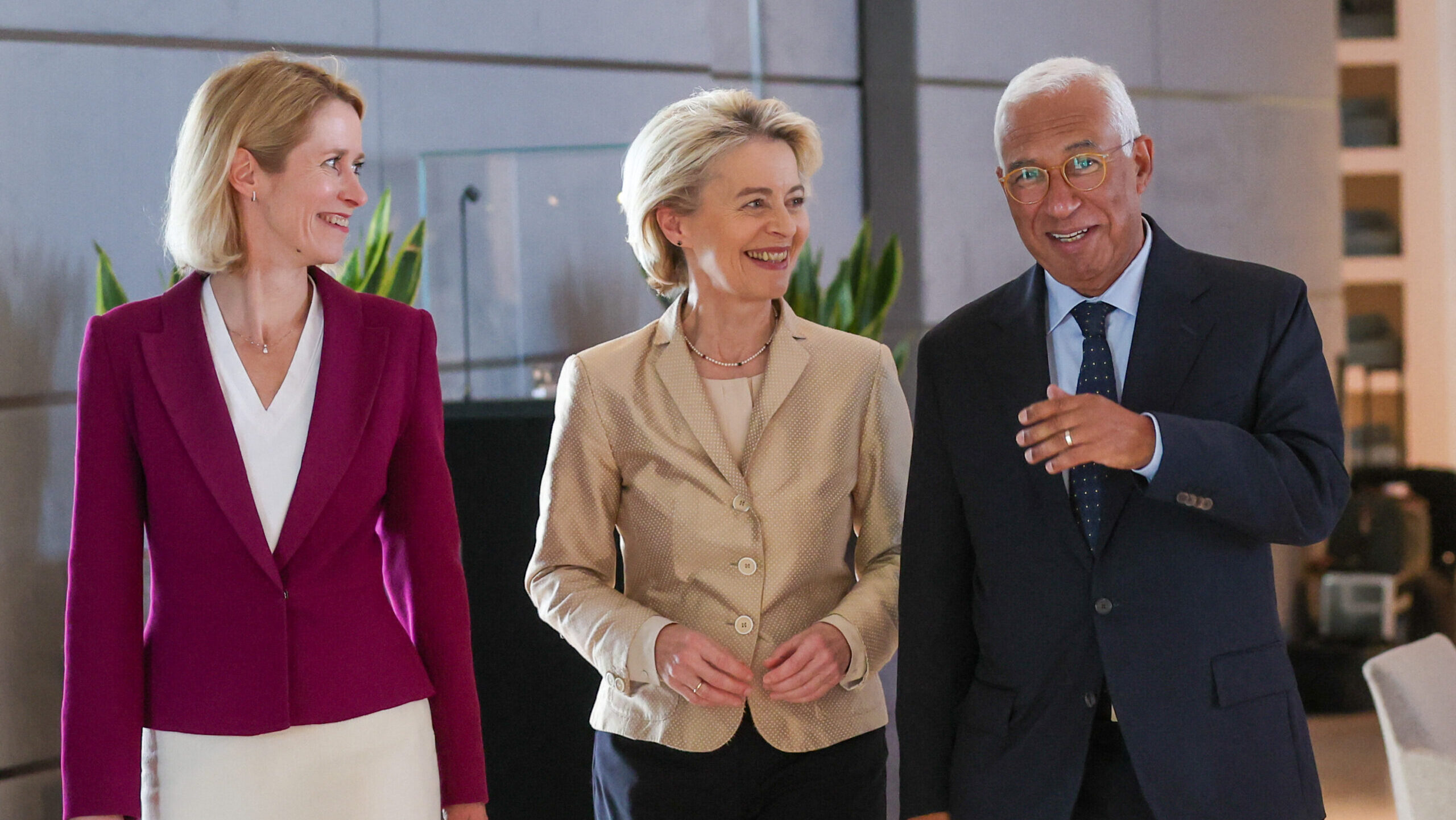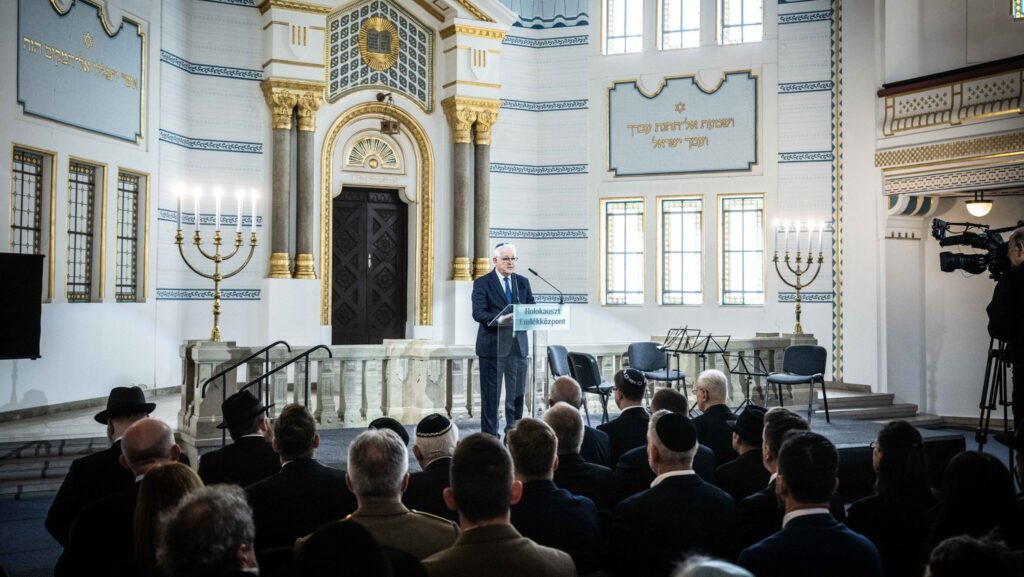Anxiety is running high in Brussels after US President Donald Trump announced on Wednesday that negotiations to end the war in Ukraine would start ‘immediately’. This followed separate phone calls between Trump and Russian President Vladimir Putin, as well as Ukrainian President Volodymyr Zelenskyy. However, Washington did not inform the European Union or its leaders in advance of these negotiations, leaving them in shock and despair.
Now, following a dramatic shift in the geopolitical realities surrounding Ukraine, Brussels has taken an increasingly firm stance on the negotiations. On Wednesday evening EU’s foreign policy chief Kaja Kallas issued a statement—backed by six European NATO members—demanding a central role for Europe in the peace talks. On Friday Kallas reiterated Brussels’ insistence on being included in the negotiations, which are crucial for the continent’s future. Speaking to ERR Radio, she stated: ‘No peace deal for Ukraine can be made without Kyiv and Europe at the table.’
Kyiv’s participation in the negotiations has been confirmed by both Trump and Vice President JD Vance, as well as by the Kremlin. However, the EU’s involvement remains uncertain. When asked about the participants, Trump stated: ‘We would have Ukraine, and we have Russia, and we’ll have other people involved, a lot of people,’ carefully avoiding any mention of the EU. According to media reports, China could be among those ‘other people’ Trump referred to, further undermining Europe’s image as a major player on the world stage.
Deserved, Not Given
Looking at the figures—the humanitarian, financial, and military aid provided to Ukraine, as well as the sanctions imposed on Russia to weaken its economic strength—it is evident that the EU should have a seat at the negotiating table. However, if we consider the EU’s approach to the conflict over the past three years, particularly its stance on negotiations, the picture becomes far less clear. In fact, the EU’s past behaviour justifies Washington’s decision to sideline Brussels.
As Hungarian Prime Minister Viktor Orbán pointed out in a post on X on Thursday, responding to Kallas’ statement from the previous day, participation in negotiations is not a given—it must be earned through strength, smart diplomacy, and effective leadership. Brussels clearly lacks these qualities, and its approach over the past three years contradicts its current demand to be included in the peace talks.
Making Negotiations Impossible
For a long time Hungary was the lone voice advocating for peace in Ukraine. From day one, the Hungarian government’s stance has remained unchanged. For this, Viktor Orbán was subjected to an intense smear campaign, with efforts to discredit and vilify him and his position. These attacks were led by top leaders of EU member states and even high-ranking EU officials. With little exaggeration, one could say that Brussels’ elite have spoken more about negotiations in the past few days than they have in the past three years combined. The EU now demands a seat at the table despite never having wanted the table to exist in the first place.
To put things into perspective, let’s recall some statements from EU leaders and officials over the past year:
- ‘There is no room for negotiations with Russia until Ukraine’s sovereignty is fully restored.’ (European Commission President Ursula von der Leyen, January 2024)
- ‘Calling for peace talks now would be a mistake. Russia must first be defeated on the battlefield.’ (Former EU foreign policy chief Josep Borrell, December 2023)
- ‘Negotiating with Russia would only embolden them. The only viable path is to continue military support for Ukraine.’ (French President Emmanuel Macron, February 2024)
- ‘We will not pressure Ukraine into any premature negotiations with Russia.’ (German Chancellor Olaf Scholz, November 2023)
- ‘Those advocating for negotiations ignore the reality that Russia does not negotiate in good faith.’ (Then-Prime Minister of Estonia, now EU foreign policy chief Kaja Kallas, January 2024)
- ‘We must not fall into the trap of believing that negotiations will bring peace. Only Ukrainian victory can do that.’ (Then-Prime Minister of the Netherlands, now NATO Secretary General Mark Rutte, March 2024)
- ‘Ukraine will decide when negotiations happen, not Russia and not Europe.’ (Former European Council President Charles Michel, December 2023)
- ‘Negotiating now would send the wrong message to Russia. We must keep supporting Ukraine militarily.’ (Former NATO Secretary General Jens Stoltenberg, February 2024)
There is much more that could be cited, but the message is clear: Brussels never wanted negotiations. On the contrary, it did everything possible to prevent them from happening.
‘Brussels never wanted negotiations...it did everything possible to prevent them from happening’
In July 2024 Hungary assumed the rotating presidency of the European Council for six months. As it became clear that Brussels would not take any initiative toward ending the conflict, Viktor Orbán embarked on a peace mission, engaging with both warring parties and international actors who could influence the negotiations. In the span of a few days, he travelled to Kyiv, Moscow, Beijing, Washington, and Mar-a-Lago—the residence of then-presidential candidate Donald Trump.
This initiative sparked outrage among Western European leaders and EU officials, leading to serious discussions about penalizing Hungary over its peace efforts. ‘This peace mission was nothing but an appeasement mission,’ von der Leyen remarked, likening Orbán’s initiative to Britain’s policy of appeasement towards Nazi Germany before World War II. Due to Hungary’s pro-peace stance, a plenary session in the European Parliament—intended to focus on the Hungarian EU presidency’s agenda—turned into a political mudslinging, led by none other than von der Leyen herself.
The Tale of a Child and a Toy
Orbán launched a second peace initiative at the end of Hungary’s presidency in December, proposing a Christmas ceasefire. The idea was swiftly dismissed by Zelenskyy and met with similar rejection from within the EU.
Brussels’ opposition to negotiations remained unchanged even as Trump’s inauguration on 20 January approached. ‘The vast majority of EU leaders—with the exception of Hungary and Slovakia—agree that there is no point in pushing Zelenskyy to negotiate while Russia’s President Vladimir Putin has so far not signalled he would be willing to,’ Euractiv reported on 15 January. Of course, Putin had shown no willingness, given that EU officials had repeatedly declared their refusal to engage in negotiations of any kind.
‘Should the EU be left out, however, the blame will not lie with Trump. It will rest squarely on Brussels’
Now, after Trump’s announcement, they suddenly demand a seat at the table. They act as if they have always championed negotiations. The situation is reminiscent of a child who ignores a toy until someone else takes it—only then does the child cry and claim it as their favourite. Brussels is that hysterical child and peace talks are the toy they never wanted.
That being said, these negotiations carry immense significance—they could be considered the Yalta Conference of our generation. Europe indeed needs, though does not deserve, a seat at the table. If it is excluded, the consequences could be severe. Hungary knows all too well what it means when great powers decide the fate of a country over its head. Should the EU be left out, however, the blame will not lie with Trump. It will rest squarely on Brussels.
Related articles:








